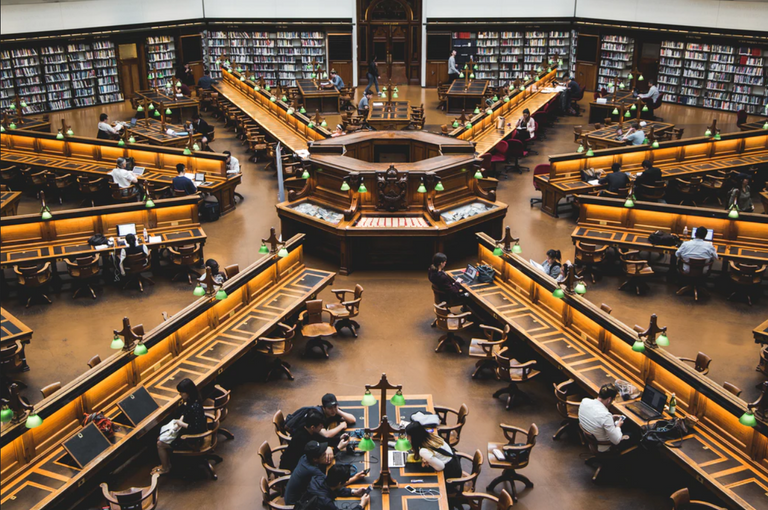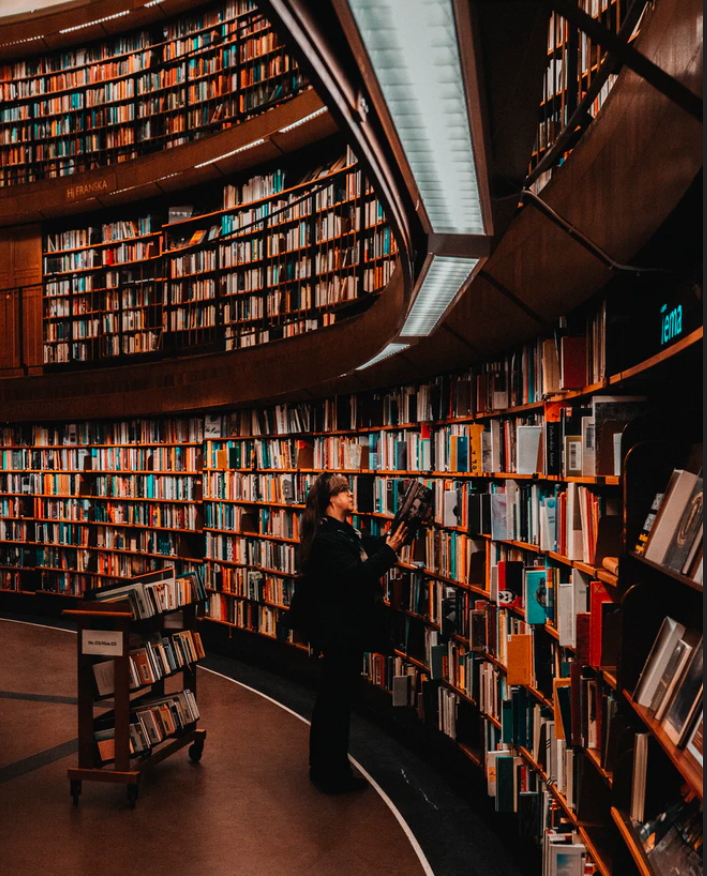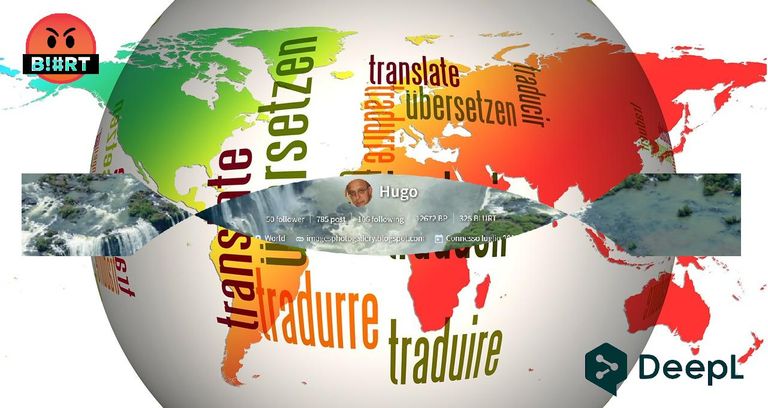
Since I was young I have always been a regular visitor to public libraries in my country, partly because of economic needs and partly because I have always been attracted to the mystical atmosphere that a library generates. Not only for study. But also as the only means to support my literary ambitions (as a reader, let's understand).
Even when for political-economic reasons we were forced to emigrate and settle in Europe, I always tried to frequent public libraries as a means to improve my language and learn new things.
I remember meeting in Italian public libraries authors like John Grisham, Jeffery Deaver, H.P. Lovecraft, Patricia Cornwell, Torey Hayden, Khaled Hosseini and so many others that if I had had to buy the books, I might not have done it. With truly exceptional translators.
A new reality hand in hand with digital content.
Even though the books in Europe (comparatively speaking) cost much less than in LATAM. And they have great binding and paper quality.
To make a realistic comparison, let's say that in Italy I used to buy (and now you can buy even less with discounts) bestsellers for less than 20 euros, which represents three hours of work for an employee.
If they are not new works or of not so well known authors they can be obtained at half price.
For this reason, even though I was able to build up a nice personal library, I never stopped frequenting public libraries.
I remember from all these old public libraries the classic cards with that universal nomenclature unintelligible to us and understandable only to librarians. The journey to the shelf, sometimes with the help of ladders, to be able to hold the coveted volume in our hands. With a 10-15 day loan and a renewal or not according to the demand for the volume.
It is clear that digitization is imposing a new reality to which public libraries do not escape.
In the United States, for example, most newspapers are digitized in the form of electronic files that can be consulted through a monitor. This has led to an immense task of data-entry of millions and millions of data.
On the other hand, let's keep in mind that public libraries in most of the world are subsidized by municipal, regional, provincial or national governments. Therefore, providing them with a technological structure not only entails a significant expense but also the training of specialized personnel.
I believe that the first step is being taken in some schools in an experimental way through the exhibition of documentaries, study of marine subsystems, collective diving practices, etc. using virtual and augmented reality technologies known by the acronyms VR and AR.
There are even tools such as ARize and Arloopa that are being used with good success integrating with computers installed in the classroom, iPads or electronic whiteboards installed for this purpose.
This same system can be transferred to the public library for visualization and interaction with some kind of content.
Let's imagine, for example, taking a virtual tour. It is enough to type Rome, London, Paris, Tokyo to tour these beautiful places at 360 degrees.
The renowned British naturalist David Attenborough has partnered with Expeditions to recreate content narrated by himself. And the examples are growing every day.
Technology is making giant strides, and the thought of what VR and AR may have in store for us in a decade's time may seem more like wishful thinking than wishful thinking.
But the truth is that the alma-mater of libraries (not only public), which is paper, is disappearing. Newspapers have less and less official circulation and their digital content is increasing day by day, traditional books are increasingly being replaced by ebooks (even with the concrete possibility of pirating and downloading them for free) and the instruments used for reading are becoming more and more sophisticated and numerous.
An example? The iPad was actually born as a book reader trying to compete with Kindle. However, in a short period of time, tablets have become true portable computers that, apart from certain requirements - data storage, memory capacity, etc. - perfectly fulfill their function and have displaced laptops in an important sector of the market.
Virtualization is a reality (whether VR or AR) and the possibility of applying them to education and instruction in general are stepping stones that, I am convinced, we will be climbing in the years leading up to the next decade.
Having the possibility to access.


Desde joven he sido siempre un asiduo concurrente a las bibliotecas públicas de mi país, un poco por necesidades económicas y otro poco porque siempre me ha atraído ese ambiente místico que genera una biblioteca. No solo por estudio. Sino también como el único medio que sustentaba mis ambiciones literarias (como lector entendámosnos).
Incluso cuando por razones político-economómicas nos vimos obligados a emigrar y radicarnos en Europa siempre traté de frecuentar las bibliotecas públicas como medio de mejorar mi idioma y aprender cosas nuevas.
Recuerdo haber conocido en las bibliotecas públicas italianas a autores como John Grisham, Jeffery Deaver, H.P.Lovecraft, Patricia Cornwell, Torey Hayden, Khaled Hosseini y tantos otros que si hubiera tenido que comprarme los libros, tal vez no lo hubiera hecho. Con traductores verdaderamente excepcionales.
A pesar de que los libros en Europa (comparativamente hablando) cuestan mucho menos que en LATAM. Y tienen una encuadernación y una calidad de papel estupendos.
Para hacer una comparación realista digamos que en Italia compraba (y aén se pueden comprar incluso menos con los descuentos) bestseller a menos de 20 euros que representan tres horas de trabajo de un empleado.
Si no son obras nuevas o de autores no tan conocidos se pueden conseguir a mitad de precio.
Por este motivo a pesar de que pude formar una linda biblioteca personal nunca dejé de frecuentar las bibliotecas públicas.
Recuerdo de todas estas viejas bibliotecas públicas las clásicas fichas con esa nomenclatura universal inentendible para nosotros y entendible solo para los bibliotecarios. El recorrido hasta el anaquel, a veces con el auxilio de escaleras, para poder tener entre nuestras manos el ansiado tomo. Con un préstamo a 10-15 dias y una renovación o no según la demanda que podía tener el volumen.
Una nueva realidad de la mano con los contenidos digitales.
Es evidente que la digitalización está imponiendo una nueva realidad a la cual no escapan las bibliotecas públicas.
En EE. UU, por ejemplo la mayor parte de los diarios están digitalizados bajo la forma de fichas electrónicas consultables a través de un monitor. Lo que ha llevado a una inmensa tarea de data-entry de millones y millones de datos.
Por otro lado tengamos en cuenta que las bibliotecas públicas en la mayor parte del mundo son subsidiadas por los gobiernos municipales, regionales, provinciales o nacionales. Por lo tanto dotarlas de una estructura tecnológica no solo comporta un gasto importante sino una preparación de personal especializado.
El primer paso creo que se está dando en algunas escuelas en manera experimental a través de la exhibición de documentales, estudio de subsistemas marinos, prácticas colectivas de buceo, etc usando las tecnologías de realidad virtual y aumentada conocidas con las siglas VR y AR.
Hay herramientas incluso como ARize y Arloopa que están siendo usadas con un buen suceso integrándose con las computadoras instaladas en el aula, iPads o pizarras electrónicas instaladas a tal fin.
Este mismo sistema puede ser trasladado a la biblioteca pública para la visualización e interacción con lagún tipo de contenidos.
Imaginemos por ejemplo hacer un tour virtual. Es suficiente escribir Roma, Londres, Paris, Tokio para recorrer estos hermosos lugares a 360 grados.
El reconocido divulgador naturalista británico David Attenborough se ha asociado con Expeditions para recrear contenidos narrados por él mismo. Y los ejemplos van aumentando cada dia más.
La tecnología hace paso de gigantes, y pensar que nos pueden deparar la VR y AR dentro de una década se puede parecer má a un vaticinio que a una expresión de deseos.
Pero lo cierto es que el alma-mater de las bibliotecas (no solo públicas) que es el papel está desapareciendo. Los diarios tienen cada vez menos tirada oficial incrementando dia a dia sus contenidos diigitales, los libros tradicionales están siendo cada vez más reemplazados por los ebooks (incluso con la concreta posibilidad de piratearlos y descargarlos grauitamente) y los instrumentos usados para > Quotesu lectura son cadá vez más sofisticados y más numerosos.
Un ejemplo?> El iPad nació en realidad como un lector de libros tratando de competir con Kindle. Sin embargo los tablets se transformaron en poco tiempo en una verdadera computadora portátil que, aparte de ciertos requisitos -almacenamiento de datos, capacidad de memoria, etc.- cumplen perfectamente con su función y han desplazado a los mismos portátiles en un importante sector del mercado.
La virtualización es una realidad (ya sea VR o AR) y la posibilidad de aplicarlas a la educación y a la instrucción en general son peldaños que, estoy convencido, iremos subiendo en los años que precederán la próxima década.
Tener la posibilidad de acceder a esta sorprendete tecnología en las bibliotecas públicas y ser compartida por todos los usuarios sin distinción de clase social, nivel económico o cualquier otra restricción será un gran logro para toda la humanidad.



It is a pleasure for us to share our best wishes and congratulations. You have been given a virtual hug by the curation account @newvisionlife and manually curation by @OneRay.
Life never ends and there are new ways to see it. Tell us yours in our community
Es un placer para nosotros compartir nuestros mejores deseos y felicitaciones. Usted ha recibido un abrazo virtual de la cuenta de curación @newvisionlife y curado manualmente por @OneRay
La vida nunca termina y hay nuevas formas de verla. Cuéntanos la tuya en nuestra comunidad
Gracias por apoyar y curar mis contenidos a todo el equipo de @newvisionlife y en particular a mi buen amigo @OneRay.
Dear @hugo1954, your content was selected manually by curators @nalexadre, @ten-years-before to receive a curation from BeBlurt 🎉
Thank you for supporting, voting and curating my content @beblurt.